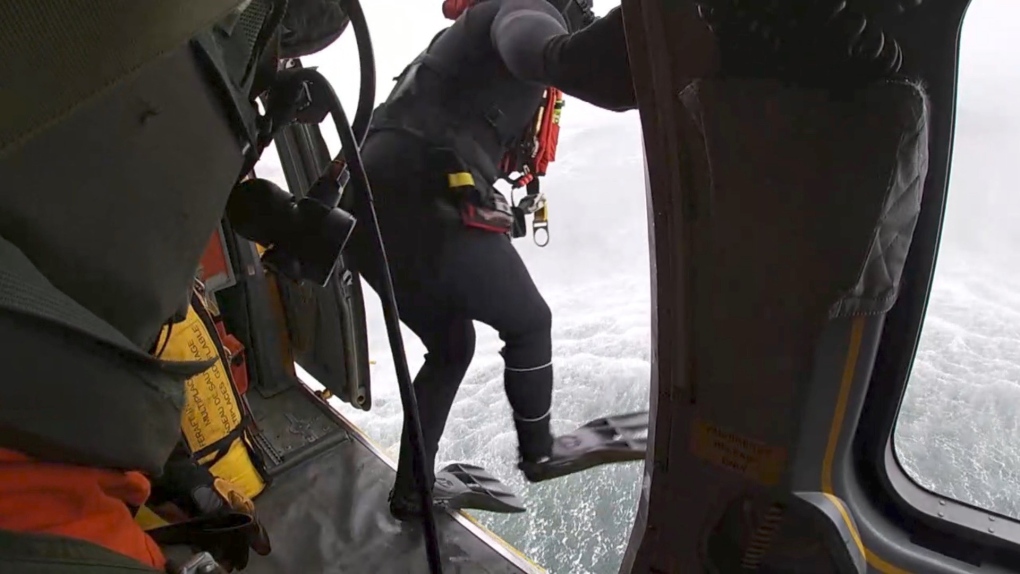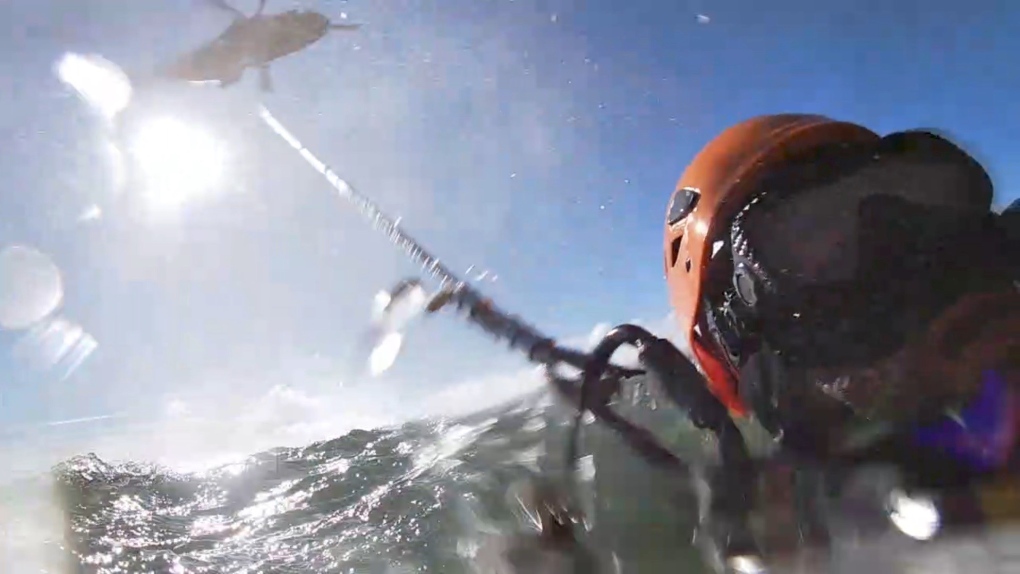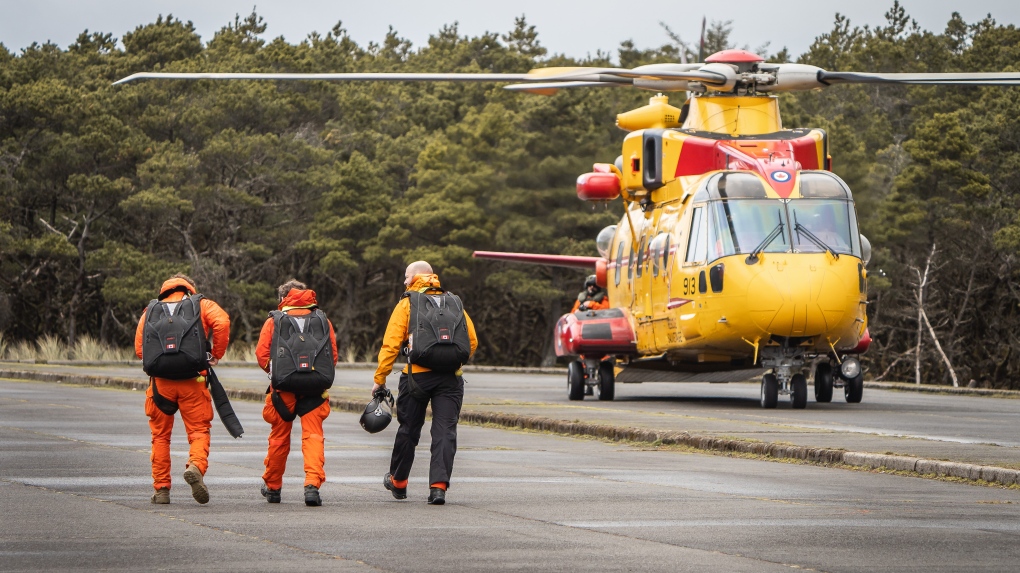Vancouver Island military search and rescue crews train with U.S. Coast Guard
Crews from 19 Wing Comox are back on the ground after attending a week of specialized training in the United States, learning special techniques to get in and out of extreme ocean waves.
"It was awesome to be able to train in a more realistic environment, out of our normal rules," said Master-Cpl. Carl Mozienko of Comox's 442 Transport and Rescue Squadron.
Three pilots, two flight engineers and three search and rescue technicians, spent five days training with members of the U.S. Coast Guard down in Astoria, Oregon, near the mouth of the Columbia River.
The location was chosen because of its rough seas, according to Brad Pigage, a chief aviation survival technician for the Advanced Helicopter Rescue School .
"Cape Disappointment is known for being the graveyard of the Pacific, so a lot of big waves, heavy surf, bad weather, low visibility, all that stuff you can expect right there," he said.
"At the school we pride ourselves at putting these air crew and rescue swimmers and SAR techs through a higher intensity situation, high-risk training, and we mitigate the risk by having more ground party and safety measures in place," said Pigage.
Cpt. Joseph Jacques was one of the Cormorant pilots taking part in the training.
"The U.S. Coast Guard, they’re the subject matter expert in terms of high-surf training, and that school specifically, so we definitely learned a lot from them," he said.
While the SAR techs were the ones diving into the cold ocean, the pilots and crew members onboard the helicopter had their own tasks to master.
 (442 Transport and Rescue Squadron)Jacques says the Cormorant typically hovers around 1.5 metres to three metres above the water but had to stay higher due to the high waves and breaking surf.
(442 Transport and Rescue Squadron)Jacques says the Cormorant typically hovers around 1.5 metres to three metres above the water but had to stay higher due to the high waves and breaking surf.
"We had to adjust our procedure to stay higher and look at the waves, count the waves, communicate between the crew members as to how low it’s safe to descend, and then timing the exit for the SAR-tech to jump on the crest of the waves," Jacques said.
While the crews regularly practice their techniques around the Comox Valley, they do so in fresh water environments avoiding salt water, which is much harder on the aircraft.
"We don’t really typically do it, so it’s only going to be in operations," said Mozienko.
"So we can end up being in that situation without really realistic training," he said. "But going down there gave us that opportunity to swim in big waves."
 (442 Transport and Rescue Squadron)The course also included vertical cliff rescues, urban search and rescue, as well as cave rescues.
(442 Transport and Rescue Squadron)The course also included vertical cliff rescues, urban search and rescue, as well as cave rescues.
"You learn how to enter the cave and going out of the cave and learn how to use the helicopter to get yourself out of it as well, because the currents are going to be different and you don’t want to be stuck inside," Mozienko said.
While the American rescue crews use smaller helicopters than the Cormorant, working alongside their southern counterparts gave the crew from Comox the chance to share techniques.
"They’re flying the MH60 and the 65, the J-Hawk and the Dolphin, which are way smaller," said Jacques.
"They don’t have the same drown draft on their helicopter, don’t have the same weight and references, so we have to tweak the techniques a little bit," he said.
 (442 Transport and Rescue Squadron)
(442 Transport and Rescue Squadron)
CTVNews.ca Top Stories

LIVE UPDATES Critical infrastructure 'successfully protected': Jasper park officials
Jasper National Park officials in an update said all critical infrastructure in the townsite has been "successfully protected, including the hospital, emergency services building, both elementary and junior/senior schools, activity centre and wastewater treatment plant."
Alberta premier says a third, perhaps half, of all Jasper buildings destroyed by fire
Alberta Premier Danielle Smith says early reports indicate a third and perhaps up to half of all buildings in the historic Rocky Mountain resort town of Jasper have burned in a wildfire.
Prince William's 2023 salary revealed in new report
Newly released financial reports show that William, the Prince of Wales, drew a salary of $42.1 million last fiscal year, his first since inheriting the vast and lucrative Duchy of Cornwall.
Tourist suffers 3rd-degree burns to feet after losing flip flops amid soaring temperatures in Death Valley
A tourist was hospitalized after suffering third-degree burns on his feet on Saturday when he lost his flip flops at a national park in California where temperatures soared past 50 C.
'There's mom and dad's house': New video appears to show destruction of Jasper neighbourhood
Video posted to social media on Thursday morning appears to show the charred remains of a Jasper, Alta., neighbourhood.
Former judge with disputed Cree heritage likely has Indigenous DNA: law society
The Law Society of British Columbia says a DNA test shows a former judge and Order of Canada recipient accused of falsely claiming to be Cree "most likely" has Indigenous heritage.
Australian field hockey player opts to amputate part of his finger in order to compete in Paris Olympics
In the run up to the Paris Olympics, athletes have been stepping up their preparations in order to maintain their edge over competitors. But for Australia’s Matt Dawson, those preparations looked a little different this year, with the field hockey player opting to have part of his finger amputated in order to compete in the Games.
Canada to bring home fewest Olympic medals since 2012, according to forecaster
Fewer Canadians are expected to reach the Paris podium than in the previous two Olympic Summer Games, a global data analytics company predicts.
Jennifer Aniston criticizes JD Vance for 'childless cat ladies' remarks: 'I pray that your daughter is fortunate enough to bear children'
Jennifer Aniston is criticizing JD Vance for comments he made in his past about women without children.

































